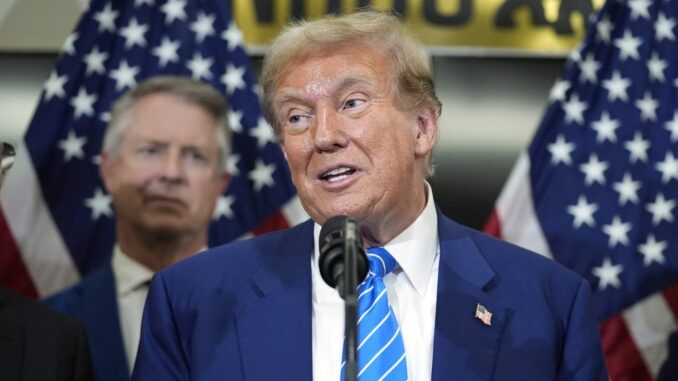
I had the opportunity to accompany President Donald Trump and his team for three meetings in Washington, D.C., last week.
First, President Trump met with House Republicans. Then he met with key chief executive officers of many of America’s largest businesses at the Business Roundtable. Finally, President Trump met with nearly every Senate Republican.
Each meeting was unique. The House Republicans were enthusiastic. Almost 200 of them showed up for a 9:30 a.m. session at the Capitol Hill Club. President Trump’s ability to relate individually with members was remarkable. He looked around the room and made specific references to their campaigns, districts and issues. It was a powerful reminder that the businessman who came down the escalator in June 2015 is a serious national political leader. President Trump has ties and knowledge extending into virtually every congressional district in the country.
The most striking part of President Trump’s presentation was a story he told about a waitress in Nevada. She complained to him about all the paperwork she had to fill out under new regulations issued by the Biden administration. Trump talked to her about it and said, “Why don’t we just quit taxing tip money?” She was wildly enthusiastic. Since Trump has publicly talked about this plan, a lot of other tip workers have been thanking him. A bill like this would appeal to millions of workers who normally don’t think of themselves as Republicans. It is part of growing a Trump coalition that may be able to replace the Roosevelt coalition which has governed since 1932.
After the House GOP, we went to the Business Roundtable. Larry Kudlow, whose Fox Business show is the highest-rated business program on cable, interviewed the former president. Since Kudlow had been the chief domestic policy adviser in the Trump White House, they have a warm rapport. The CEOs listened carefully and asked difficult, high-level questions. They agreed that regulations were an even bigger job killer than higher taxes. They also agreed the world had become dramatically more dangerous — and that strong American leadership was a key to being able to operate multinational companies in a world economy. It was a sophisticated dialogue with people who make billion-dollar decisions.
Finally, Sen. John Barrasso of Wyoming had invited President Trump to chat with the Senate Republicans. Almost all of them were there. Leader Mitch McConnell from Kentucky sat two seats over from the former president, and Trump recognized him several times. While the two have differed deeply in the past, Leader McConnell is clearly committed to the Republican Party. At the same time, President Trump totally understands that as the presidential nominee and future president, he must unify his party. This has brought both men into an alliance that most reporters would have thought impossible 60 days ago.
In fact, unity was a key message in the House and Senate GOP meetings. There was a clear sense from Trump and the elected legislative members that they were now on a five-month closing campaign. They know they need a unified and enthusiastic Republican Party to be victorious.
One topic that came up in all three meetings was President Joe Biden’s wandering around aimlessly at the G7 meeting in Italy. Italian Prime Minister Giorgia Meloni had to rescue him and walk him back into the group. In every meeting, there was a widespread general sense that Biden’s cognitive problems may be accelerating — and that as commander in chief that could be a real problem.
The other issue that came up was the Russian naval presence off Miami. When a nuclear submarine and six other Russian naval vessels docked in Havana, it brought back memories of the 1962 Cuban missile crisis. No one believed that President Biden had the energy and cognitive ability to match President John F. Kennedy’s performance 62 years ago.
It was an impressive day. The Trump team may be as good as any presidential campaign team I have ever seen. They are a powerful underpinning to the candidate’s own charismatic appeal, speech-making ability and extraordinary knowledge of details.
It was an impressive visit to Washington. It was also a far cry from his first Washington visit on March 21, 2016. He had come for a policy meeting that Callista and I attended. At that time, he was a businessman still seen as a distant underdog and a political novice. Most of these assumptions were wrong then. They are all wrong now.
Today, President Trump is a seasoned veteran with amazing knowledge about personalities and policies not only in America but around the world.


